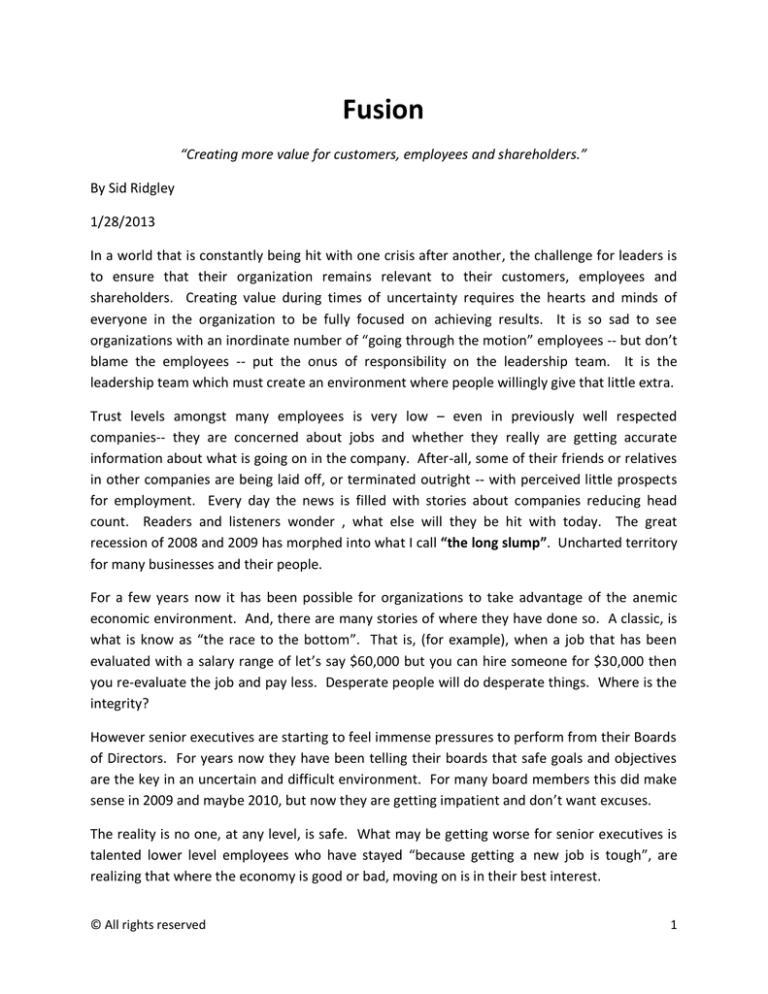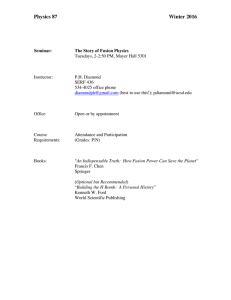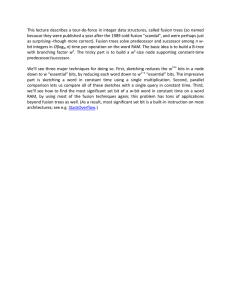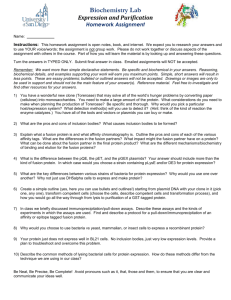
Fusion
“Creating more value for customers, employees and shareholders.”
By Sid Ridgley
1/28/2013
In a world that is constantly being hit with one crisis after another, the challenge for leaders is
to ensure that their organization remains relevant to their customers, employees and
shareholders. Creating value during times of uncertainty requires the hearts and minds of
everyone in the organization to be fully focused on achieving results. It is so sad to see
organizations with an inordinate number of “going through the motion” employees -- but don’t
blame the employees -- put the onus of responsibility on the leadership team. It is the
leadership team which must create an environment where people willingly give that little extra.
Trust levels amongst many employees is very low – even in previously well respected
companies-- they are concerned about jobs and whether they really are getting accurate
information about what is going on in the company. After-all, some of their friends or relatives
in other companies are being laid off, or terminated outright -- with perceived little prospects
for employment. Every day the news is filled with stories about companies reducing head
count. Readers and listeners wonder , what else will they be hit with today. The great
recession of 2008 and 2009 has morphed into what I call “the long slump”. Uncharted territory
for many businesses and their people.
For a few years now it has been possible for organizations to take advantage of the anemic
economic environment. And, there are many stories of where they have done so. A classic, is
what is know as “the race to the bottom”. That is, (for example), when a job that has been
evaluated with a salary range of let’s say $60,000 but you can hire someone for $30,000 then
you re-evaluate the job and pay less. Desperate people will do desperate things. Where is the
integrity?
However senior executives are starting to feel immense pressures to perform from their Boards
of Directors. For years now they have been telling their boards that safe goals and objectives
are the key in an uncertain and difficult environment. For many board members this did make
sense in 2009 and maybe 2010, but now they are getting impatient and don’t want excuses.
The reality is no one, at any level, is safe. What may be getting worse for senior executives is
talented lower level employees who have stayed “because getting a new job is tough”, are
realizing that where the economy is good or bad, moving on is in their best interest.
© All rights reserved
1
Core issues:
In times of crisis one must be aware of the potential dangers that lurk in the shadows, while
being mindful of the opportunities that really do exist. Hunkering down in the bunker
promotes retrenchment and that may help an organization survive. However the opportunities
to thrive will be missed. All too often when times are difficult or challenging, managers will see
and focus almost exclusively on the immense number of problems that exist. They will focus
their energies on eradicating the problems. Even if it means performing surgery on the
organization. Leaders recognize that there will always be good times and tough times. During
tough times they will concentrate on short term goals while executing all tasks flawlessly -- but
not at the expense of keeping an eye out for opportunities. In a tough economic environment
collaboration, creativity and innovation are the keys to progress.
Leaders and managers
Einstein said that finding solutions often requires a higher level of thinking than what caused
the problem or issue in the first place. Managers have to realize that the likelihood of
administering their way out of the current difficult marketplace environment is remote. They
need to unlock the leader within to do what it takes to ensure that the organization and its
people are doing the right things. Then they must use their managerial prowess to ensure that
the right things are done right. The end result is a company that is relevant to its customers,
employees and shareholders. By unlocking the leader within there will be a fusion of energy,
activity and experience – all focused on a vibrant organizational purpose. This in turn creates a
sustainable value proposition to customers, employees and shareholders. The reality is, there
is always energy in an organization but left un-channelled or un-focused, it simply dissipates -a true waste.
Fusion defined
Employees want leaders who lead from the front and not from the bunker. Leaders who
inspire. Leaders who promote cooperation and collaboration in the attainment of goals and
objectives. Fusion is what happens when employees truly connect and support one another.
Fusion is what happens when customers feel a higher level of loyalty to the company and its
products. Fusion is what happens when the company owners have faith that the organization
will achieve its goals thereby unlocking the money chest to ensure that the company has the
resources it needs. There is a synergistic effect when people work together that provides
immense benefits to all stakeholders: 1 + 1 = 3. In difficult times organizations and their people
spend too much time focusing on the negative, when in fact, there is opportunity in the
marketplace.
© All rights reserved
2
Whether it be creating an ideal place to work. Or an ideal place to do business with that is
operationally excellent. Leaders and those that follow them have to harness the power of
connection and collaboration, in short to focus on the things that they can do together. People
will willingly and loyally follow someone if they believe that the destination is purposeful and
worthy. Most people want to know that their efforts, experience, and energy, are used in a
meaningful way. Inspiration is about emotional buy-in which will keep people going during
dark and difficult times. It is also what helps to create a “we” environment. Fusion is
combining employee prowess and energy with the organization’s products and services in order
to create something with a high value proposition that is relevant and sustainable.
The bringing together of the organization’s passion, energy, experience and where-with-all,
helps the organization thrive during tough times. In fact, they might even emerge in a stronger
position when the overall market improves—which it will. Connecting people to a strong
purpose unleashes the emotion of passion in all of us-- to be a part of something bigger than
ourselves. If two people have a dollar each and they exchange dollars they still have one dollar
each. When people exchange ideas they end up with a minimum of 2 ideas and when they
collaborate those 2 ideas turn into 3 or more.
Synergism requires a high degree of collaboration and an intense focus on results.
The sum of the whole is greater than the sum of the individual parts. Apple and 3M are
companies that are good examples of synergy as they are consistently improving and constantly
bringing out new products.
Far too often people, teams and organizations misconstrue the meaning of “win-win” and what
invariably happens is they compromise until an idea or product is something that “we can live
with”. Compromising leads to mediocrity. Collaboration takes 2 or more willing parties who
share a common goal, who trust each other and are willing to share their ideas, experience and
resources in developing solutions that meet the needs of all parties.
Innovation, creativity and commitment require participation.
The enemy of progress is status quo. If we look at things in the same way as we always have we
will see the same things that we’ve always seen. Greater involvement and participation in
workplace issues and opportunities increases creativity, as it relates to problem solving, and
increases commitment, that is to do what it takes to make things happen. Different
perspectives helps collaborators and co-operators to see alternate possibilities.
Every successful project leader recognizes the need for project team members to discuss things
openly and with candour. By doing so new perspectives emerge, solutions are agreed upon and
© All rights reserved
3
understood. There is one belief about human nature that I truly subscribe to, and that is, where
understanding stops, stress, irritation, anger, conflict and disappointment begin.
Involvement in the things that affect a person's work increases their competency level, because
they know what needs to be done, why it needs to be done, when it needs to be done by , and
their role in making things happen.
Employees at all levels have 4 options: they can act, they can react, they can watch or they
can stick their head in the sand.
Our work with companies and organizations such as: RasGas (Middle East LNG producer in the
State of Qatar), York Region executive team (Ontario Canada), Beijing TV (China), American
Express (India), Horizon Utilities (Canada) and many more are excellent examples of those who
prefer and promote action over reaction.
Customer needs and expectations continue to increase.
For 15 years Simul Corporation has been conducting customer satisfaction research in the
electric utility industry. That research shows that customers expect more from their electric
utility than just providing electricity, or reconnecting the power when the lights go out. They
expect the utility to operate safely, be a leader in energy conservation, be a good corporate
citizen and so much more.
Customer expectations in every industry continue to increase.
The bottom line:
Fusion is about combining people, products and services in new ways which create better value
propositions to all stakeholders that are relevant and sustainable. It is about creating more
benefits for sticking with an organization’s people, products and services. It is only going to
happen if leaders lead from the front -- inspiring people to act. While managers say “go”,
leaders say “let’s go”. Sid Ridgley is a business leader with expertise in helping leaders increase
their company’s value proposition to its customers, employees and shareholders through
intensive organizational development strategies. He can be reached at, telephone 1-905-8957900 or 1-888-291-7892; or email: sidridgley@utilitypulse.com or sridgley@simulcorp.com.
Word count: 1,664
©2009, all rights reserved
© All rights reserved
4



